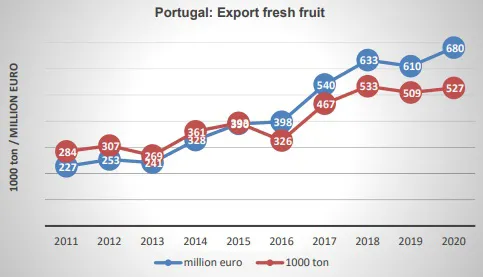Portugal has been investing heavily in its fruit sector in recent years. The fruit harvest varies from year to year, but has grown to an average of 1.2 million tonnes in the last three years, up from 0.95 million tonnes ten years ago. Major products are the growing products oranges and apples and the shrinking product (Rocha) pears. Other growth products are raspberries and blueberries.

Portugal is trying to stimulate fruit production by attracting foreign investors, among other things. Especially in the Alqueva region, where a huge reservoir makes water available for (controlled) irrigation.
2020 was a top year for the cultivation of vegetables. A total of 0.94 million tonnes of vegetables were harvested, compared to 0.8 million tonnes in the two previous years. Before that, the size of the Portuguese vegetable harvest was often in between. Tomatoes (for the fresh market) are the most important product followed by carrots, pumpkins, cabbage, onions, lettuce and cauliflower/broccoli.
Fruit export value of 780 million Euro of which raspberries account for 185 million
Portuguese fruit exports last year had a value of 780 million Euro and vegetables an export value of 185 million Euro. Raspberries were the most important export product by value at 185 million Euro, followed by oranges at 125 million Euro. Blueberries had an export value of 32 million Euro.
Oranges, pears and apples most important export products in terms of quantity
In terms of quantity, fruit exports have increased from less than 300,000 tonnes in 2011 to over 500,000 tonnes now. Oranges, pears and apples are the most important export products in that order. Tomatoes, pumpkin, kohlrabi and carrots follow these fruit products.
Portuguese raspberry exports remained stable at over 26,000 tonnes in 2020 after growing strongly in previous years. Blueberries are also a growing product, but with 5,400 tonnes, it still remains a small export product.

Spain by far the most important buyer
Spain is by far the most important buyer of Portuguese fruit and vegetables. Last year, with 417,000 tonnes, it accounted for more than half of the total. It is remarkable that of the two growth products, raspberries and blueberries, most go to the Netherlands. Last year, Portugal exported 8,500 tonnes of raspberries to the Netherlands and 2,000 tonnes of blueberries.
Sales of Portuguese pears also deviate strongly from the general pattern. Brazil is the main buyer, particularly until 2019. In 2020, Brazil was still the most important customer, but were less dominant. In the first months of this year, fewer Portuguese pears went to Brazil.
Spain also by far the most important supplier
Portugal also imports quite a lot, particularly fresh fruit. Last year, a record amount of over 0.9 million tonnes of fresh fruit was imported. In the first months of this year, imports grew again by 6%. Portugal's vegetable imports amount to almost 0.3 million tonnes.
Bananas are the most important import product, amounting to almost 240 000 tonnes. Oranges follow with 165,000 tonnes. Other important imports are onions (80,00 tonnes), pineapples (58,000 tonnes), melons (55,000), tomatoes (46,000), watermelons (44,000), apples (43,000) and mangoes (38,000).
Spain is by far the most important supplier with a quantity of 720,000 tonnes in 2020, or 60% of total Portuguese fruit and vegetable imports. South Africa and Costa Rica are the other main suppliers. Columbia follows and the Netherlands is at number five with a quantity of over 30,000 tonnes in the past year. A lot of (re-exported) mangoes go to Portugal via the Netherlands.
For more information:
Jan Kees Boon
Fruit and Vegetable Facts
fruitvegfacts@gmail.com
www.fruitandvegetablefacts.com
